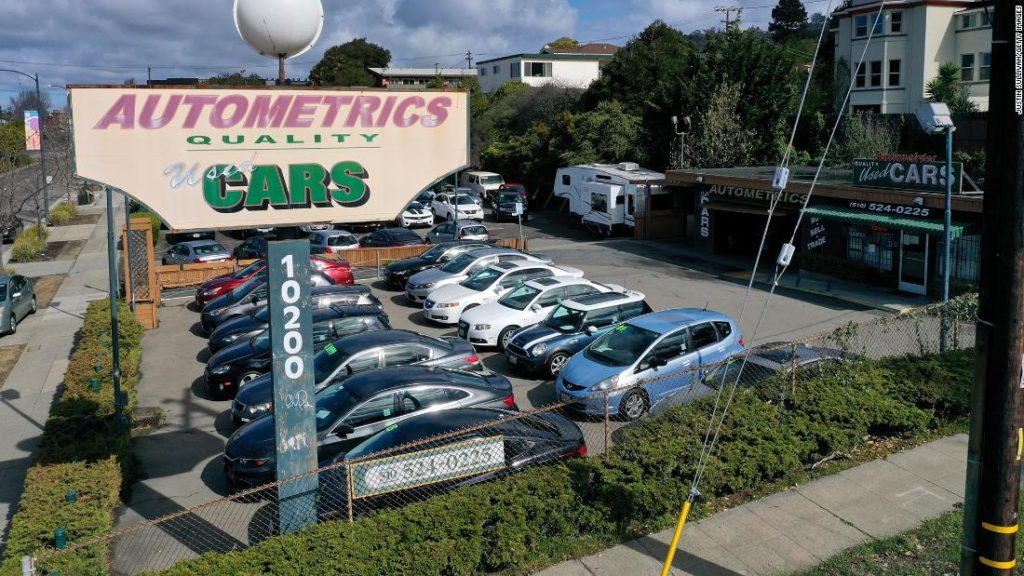Accordingly, many are turning to used cars instead. That, in turn, has driven up used car prices.
Lightly used vehicles — those that are a couple of years old with low mileage — are now selling for 75% to 80% of their original sticker price, said Ivan Drury, an auto industry analyst with Edmunds.com. As recently as 2019, a more normal year, those cars would have been going for 65% to 70% of their original price.
“If somebody has a second or third or fourth vehicle or whatever that they’re not using, they can definitely capitalize on that right now,” said David Paris, a vehicle valuation analyst with J.D. Power.
Keep in mind that you probably won’t get 70% of the vehicle’s original price from a dealer, said Drury. “But, at the same time, it’s a huge indicator that there’s a lot of value there.”
A dealer that buys your used vehicle has to leave some room to make a profit after reconditioning and marketing it. The key is figuring out how to maximize the value in your vehicle.
You could sell it yourself, of course, then all that profit will go directly into your pocket. But you have to balance the extra money you’ll make against the value of your time and aggravation of dealing with all those potential customers on your own, said Matt Degan, a senior editor at the automotive website KBB.com.
“If you sell to a dealer, you don’t have to worry about meeting somebody in a parking lot and doing that whole thing of a private party sale and all that goes into it,” he said. “Dealerships, they buy and sell cars for a living. They know what they’re doing. They’re going to have all the paperwork done. The T’s will be crossed and the I’s are dotted.”
But don’t go to just one or two dealers.
For starters, there are multiple web sites that offer a value appraisal of your vehicle and even firm offers to buy it. CarMax, Carvana, TrueCar and others will tell you how much they, or dealers they work with, will pay for your car or truck. But that alone may still not get you the best price, several experts said.
Just like their customers, car dealers have different needs and wants depending on where they are and the types of customers they serve, so it’s good to check with individual dealers in your area, said Matt Jones, director of industry education at TrueCar.
For example, a Ford dealer in the Midwest or South will likely be seeing a bigger demand for trucks. And with a slim inventory of new trucks to offer, that dealer will have a huge incentive to buy your nice used F-150 or Silverado. A Honda dealer might be perfectly willing to buy it, too, but they might not be willing to pay as much.
When you take your vehicle for an in-person appraisal at a car dealer, you’ll want to make sure it looks well taken care of. But don’t go overboard, said Jones, who said he spent years working at car dealerships. Do not pay to have your car detailed — meaning thoroughly cleaned inside and out — before taking it to a dealership, he said. It just makes you seem desperate.
“Anytime a person came in with a freshly detailed car or the glove box was completely empty, you could still see the vacuum marks and the car was shining,” he said. “We knew that person was eager to make business happen right then and there so we didn’t have to bend over backwards.”
Any dashboard warning lights, such as a “check engine” light, should absolutely be taken care of before getting the car appraised, though, he said. That’s true even if you’re sure it’s nothing serious. It’s just not a good look.
Also, get the smells out. You may not notice the smell your dog has left behind but an appraiser will. If you have a sheltered place where you can safely do this, he said leave the car with the windows open for a couple of days and maybe give it a squirt or two of air freshener, said Jones.
“It’s $3 well spent,” he said.
Even if you’re not seriously thinking of selling your car right now, said Drury, it’s a good idea to go online regularly and stay abreast of, generally, what your car is worth. Car prices aren’t expected to return to normal very soon, he said. As you’re looking, keep in mind what that car is costing you to maintain and insure.
“At a minimum, you’ll know how much it’s worth,” he said. “And, at the same time, you might actually find out, yeah, this is not worth having at the same time.”
Correction: An earlier version of this story gave the wrong last name for David Paris, a vehicle valuation analyst with J.D. Power.
You may also like
-
Afghanistan: Civilian casualties hit record high amid US withdrawal, UN says
-
How Taiwan is trying to defend against a cyber ‘World War III’
-
Pandemic travel news this week: Quarantine escapes and airplane disguises
-
Why would anyone trust Brexit Britain again?
-
Black fungus: A second crisis is killing survivors of India’s worst Covid wave

